Your cart is currently empty!
Common Questions New Mamas Ask
You can read every mom blog and baby book out there during your pregnancy. But you will still have uncertainties and questions once you are actually holding that new little person in your arms. You are sure to end up asking yourself some of the common questions new mamas ask.
Of course, it’s wise to prepare yourself as much as possible in advance. And being prepared will definitely help you know what to do with your baby. But just know that it’s normal to have a lot of questions and concerns when you become a mama, regardless of how much you educated yourself during pregnancy.

It’s easy to feel like you should instinctively know everything that is going on with your baby. Especially because you have been physically connected to him for the past nine months.
But don’t be afraid to admit when you don’t know what is going on. After all, the only way you will get any answers is to ask questions.
The following are some questions new mamas ask with some answers and explanations to help you navigate the blessings and challenges of figuring out mama life.
DISCLAIMER: Please note that this is for informational purposes only. Consult your child’s pediatrician any time you have concerns about his or her health.
Hey Mama, if you find my blog posts helpful, would you help support this blog by making purchases through product links on this page? It will not cost you any extra but the commissions I receive as an Amazon and brand affiliate help to cover the costs of operating this blog so that I can keep it running ad-free. Thank you so much for your support. You are literally the reason this blog was started and the fuel that motivates me to keep it going!
Common Questions New Mamas Ask
1. How many wet and dirty diapers should my baby have each day?
How many wet and dirty diapers a baby should be having in a 24-hour period is one of the most common questions new mamas ask. It is, after all, a key indicator of whether your baby’s basic nutritional needs are being met.
There are some slight variations in opinions on how many wet and dirty diapers per day indicate a baby is getting enough milk. Most sources agree that at least one wet and one dirty diaper in the first 24 hours of life are enough to indicate baby is getting sufficient nutrition.
After day one, the general rule is that baby should have as many wet diapers as how many days old she is up until day five (or whenever your milk comes in), as well as at least 2 dirty diapers per day. From this point on, baby should be having 5-6 wet diapers and 2 dirty diapers per day for the first month.
Le Leche League International states that after 6 weeks of age, dirty diapers may become less predictable and are not considered a good measurement of whether baby is getting enough milk.
Making sure your baby has at least five diapers per day and that baby’s urine is light or clear in color is a better indication that she is getting enough milk for the first few months of life.
I think it was around 6 months of age that the nurses at my daughter’s doctor’s office started asking if she was having 7-10 wet diapers per day as an indicator of whether she was getting enough milk and hydration.
Around 10 months, the same nurses told me it was pretty normal for her to only have about 4 saturated diapers per day. By 12 months, they said they were happy with a minimum of 2 very wet diapers per day.
2. Why does my baby want to nurse/feed constantly?
Knowing what is normal in regards to feeding is another one of the very common questions new mamas ask.
Newborns are notorious for having the top three hobbies of eating, sleeping, and pooping/peeing. The plain and simple reason for this is that their teeny tiny little bodies have a lot of work to do and need to constantly replenish their energy stores.
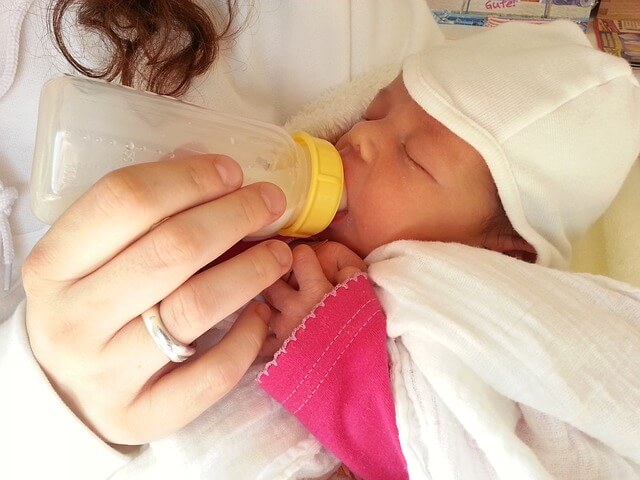
You will probably feel like all you do for those first few weeks is nurse or bottle feed your baby. But don’t be afraid of being stuck on the couch for a while; read my post on 10 Things You Can Easily Do Postpartum for some ideas on how to stay productive and entertained.
In addition to your baby’s nutrition needs, he may just want to nurse or feed for the comfort of sucking and snuggling with mommy (or daddy).
If it seems like your baby is suddenly wanting to feed literally for about 8 hours straight, it may be a growth spurt causing such intense hunger.
If you’re breastfeeding, be sure to nourish mama adequately during these times too This is not a good time to attempt to lose the pregnancy weight. Keep some easy, healthy snacks on hand to keep up your own energy.
If your little one just always wants to nurse and seems hungry too often on a regular basis, check with a lactation consultant to make sure your baby’s latch is effective.
Also consult your baby’s pediatrician to explore whether there may be an underlying medical condition going on, such as infant reflux.
Constant nursing was the sign my daughter’s pediatrician recognized as reflux (see why we didn’t medicate her reflux here and my research on underlying causes of reflux here).
He told me that nursing was the only way my two-week-old baby knew how to swallow the uncomfortable liquid coming up her throat. Besides this, sucking is a comfort mechanism for babies, so it helped ease her pain in that way as well.
3. Is my baby spitting up everything he just ate?
“Is my baby spitting up everything he just ate?!” is another one of the upsetting, but also common, questions new mamas ask.
The answer is, most likely not. Babies spit up. It’s just a fact. This should be added to the list of hobbies babies have.
According to Kelly Mom, half of all babies up to 3 months old spit up at least once per day and spitting up usually escalates around 2-4 months old.
A lot of moms become concerned that their baby’s splitting up means he is not retaining all of the nutrients he needs to grow and be healthy.
However, spitting up, while not exactly pleasant for mama or baby, is a natural result of babies’ underdeveloped lower esophageal sphincter (LES) allowing milk to easily flow backwards out of the stomach – something that is only aggravated by the fact that babies spend most of their time horizontal.
The amount of milk that comes up usually looks more copious than it is and is not a reliable indication of whether or not your baby is digesting enough nutrition for healthy development.
Instead of focusing on how often or how much milk comes up, keep an eye on your baby’s mood, weight gain and urine output. If your baby is happy, growing well and having enough wet diapers, try not to stress about the spit up.

Different babies will outgrow this at different ages, but most will be spit-up free by the time they turn a year old.
However, if you are seeing other signs that something might be off with your baby’s growth or nutrition, always voice your concerns to his pediatrician.
Some babies have a more severe problem with spitting up (A.K.A. reflux) and may require intervention if they are too uncomfortable to nurse/feed and eat enough.
Also, projectile vomiting (when a baby’s spit-up shoots out of his mouth several feet) is a concern you want to bring to his doctor’s attention.
4. Are my nipples supposed to hurt if the latch is correct?
Aaah, this one. Are your nipples supposed to hurt if baby’s latch is correct? This is one of the most confusing of all the questions new mamas ask!
Every lactation consultant and official breastfeeding website will tell you nipple pain is an indication that baby is not latched on correctly. But, in my experience, this is not entirely true.
I personally think breastfeeding proponents tell expectant mothers that nursing will not hurt because they don’t want them to get scared off by the thought of feeling pain every time baby nurses. Especially since breastfeeding is being promoted so intensely in most hospitals these days.
The lactation consultant at the hospital where I delivered my daughter assured me nursing would not be painful. When I brought up the stories I had heard about the pain, she mentioned some soreness but downplayed it as though it would be almost non-existent. So I basically expected no pain whatsoever.
So when I had continuing soreness throughout the first month of my baby’s life, I kept wondering if something was wrong with her latch. Because I was told there “shouldn’t” be any pain, I thought surly something was not right.
But the lactation consultant and the nurses at the hospital all encouraged me that her latch looked good and I was doing everything correctly.
We even went so far as to have my daughter’s minor lip tie clipped before we left the hospital because I was terrified I would fail at breastfeeding.
Now I regret putting her through that pain (brief though it was) because of perfectly normal nipple soreness that I thought was a warning sign that something was wrong.
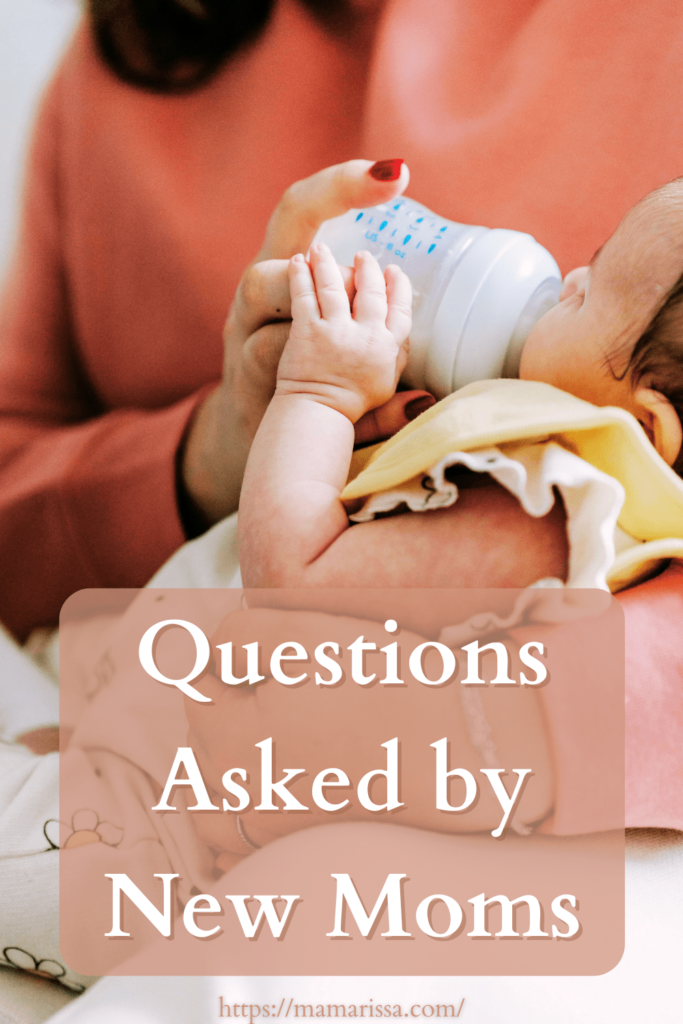
Yes, your nipples will probably hurt somewhat for a few weeks while you and baby figure out how to breastfeed. Don’t get too anxious or give up just because you have some soreness – it is normal.
However, definitely seek out help if you are having a lot of pain and/or the pain does not subside after several weeks.
I highly recommend accepting any and all breastfeeding support from your doctor or midwife, a lactation consultant, your doula if you have one, and anyone else qualified to assist you during those first days and weeks.
5. Why will my baby only sleep in my arms?
Wondering why baby will only sleep when held is one of the questions new mamas ask more often than you probably realize.
There are a couple of possibilities here and lots of questions and ideas about how to solve this issue. Just read any mom forum on the subject.
I did not even know this could be a problem before I had my baby. Babies love to sleep, right? How hard can it be to lay your sleeping or almost-sleeping baby down so she (and you) can take a nap?
If you are asking the question above, you obviously know how difficult it can be to get your baby to sleep anywhere besides snuggled against you.
This is not as uncommon as you might think. Your newborn has just emerged from a dark, warm, cozy, snuggly place where he has been doing all his snoozing with your heartbeat as his sleep machine for the past nine months.
How well would you sleep if you were kicked out of your warm bed to sleep on a cold, flat surface?
Another possibility here is that your baby is struggling with digestive discomfort and needs to be in a position other than flat on his back to be free of pain.
This turned out to be the case with my daughter who had reflux which made her uncomfortable laying down. She didn’t want to be put down at all, even when she was awake.
Some babies will outgrow this need with time, but others (like mine) will need and want to sleep with you as long as you let them.
One solution to having to constantly hold your baby while she sleeps is to use a nursing pillow that buckles around you to make it easier to carry your baby around. I used mine constantly during the first several months of my daughter’s life.
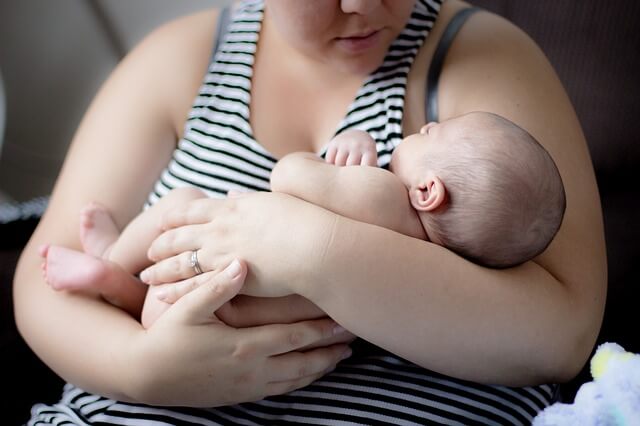
If you do not want or are not able to co-sleep with your child, you will have to find some form of sleep training method to try. Be sure to use only very gentle methods of convincing your baby to sleep on his own (no cry-it-out) until he is at least six months old.
But before you try sleep training, read my post on why sleep training is not right for every child here.
6. Is it possible for my baby to sleep with her eyes open?
Okay, this one might not exactly be one of the common questions new mamas ask. But it was a question I was asking!
Yes, it is possible for babies to be asleep with their eyes open. My daughter slept with her eyes open a lot the first couple months of her life.
Part of how I could tell she was asleep was by the way her eyes would roll around and not focus on anything. The goofy grin on her face also gave her away sometimes when I thought she was awake since she hadn’t learned how to smile while awake yet.
7. Is it normal for babies to sweat in their sleep?
One of the common questions new mamas ask that can be a little frightening is whether it is normal for babies to sweat in their sleep.
But this is actually very common. Babies are more likely to sweat a lot during sleep – even to the extent that they are drenched – than adults and children (Source).
During the first several months of my daughter’s life, she would sweat so much in her sleep that her hair and my shirt would get soaked at night.
I knew she wasn’t overdressed, because when I felt her skin and took her temperature, she was cooler than when she was awake. She was just, once again, being a baby.
Babies sweat because their nervous systems are immature, their sweat glands are different than adults, and they spend a lot of time in deep sleep when the body doesn’t move (Source). These are all perfectly innocent and normal reasons for your baby’s sweating.
However, in some cases, excessive sweating can be a sign of a more serious issue such as congenital heart disease, sleep apnea and other various health problems, so make sure to mention it to your child’s pediatrician if there are any other concerning symptoms present.
Update 6/3/2024: I had no idea at the time of writing this post that I would one day have a baby with congenital heart disease. Read more about my second daughter’s journey through open heart surgery here.
8. How often should I bathe my baby?
Ask five different mamas this question and you’ll get five different answers.

Some mamas bathe even their newborns every day, others don’t bathe at all until a certain age. I was somewhere in between.
A baby’s skin is delicate and has natural oils that are healthy. I didn’t want to be washing away my tiny baby’s built-in skin protection. Her pediatrician agreed, affirming that young babies really don’t get dirty.
However, since my daughter and I co-slept, she frequently got breast milk in her hair during the night, so she couldn’t go without baths altogether.
I bathed her on an as-needed basis, which was usually once a week or about every five days as a newborn. This lasted until she started really getting into solid food when she would get a lot messier.
Read my post on how to bathe a newborn for more details on that process.
No Question is too Stupid to Ask
I asked some questions of my daughter’s pediatrician that made me feel downright silly. But you know what? I got answers that put my anxious mama thoughts to rest.
Every new mama (and even an experienced one!) has to figure out how to do motherhood. Don’t feel embarrassed about the questions you have – everyone has lots of questions when they start a new job!
What questions have you had as a mama? Let me know in the comments!


One response to “Common Questions New Mamas Ask”
[…] I personally felt fairly confident about caring for my first baby. But still, with my second baby, I felt even more relaxed in my care for her because I had already […]

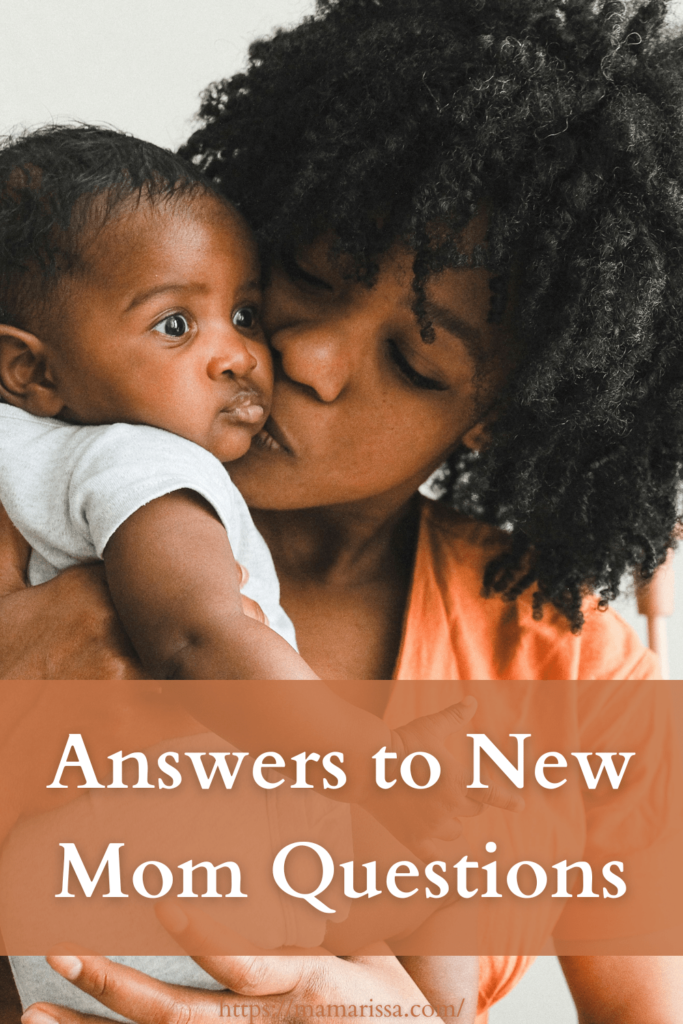

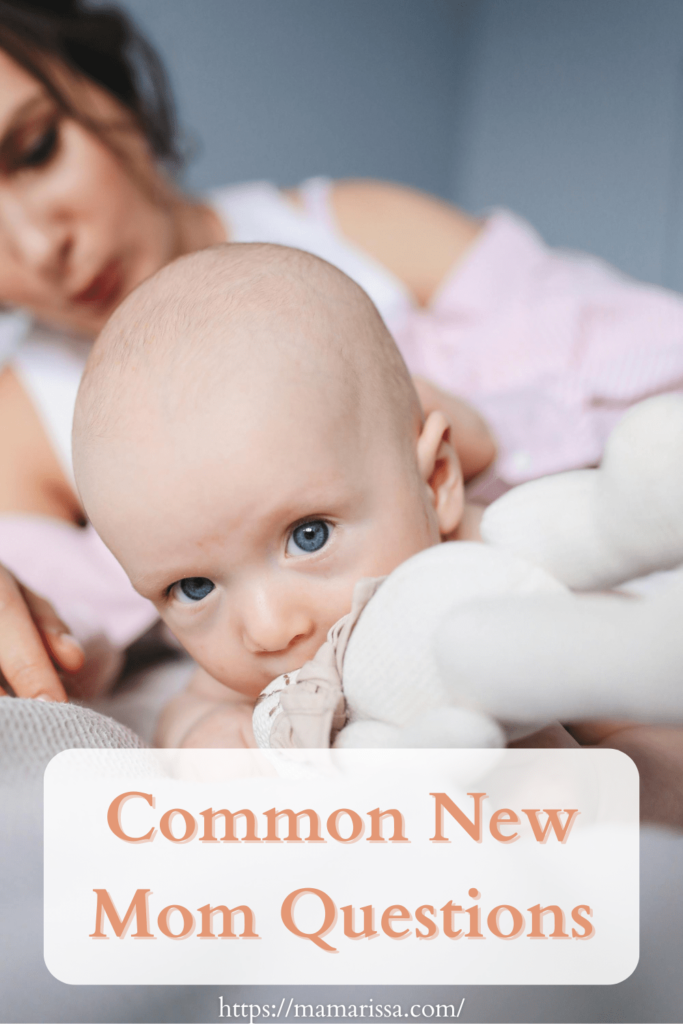
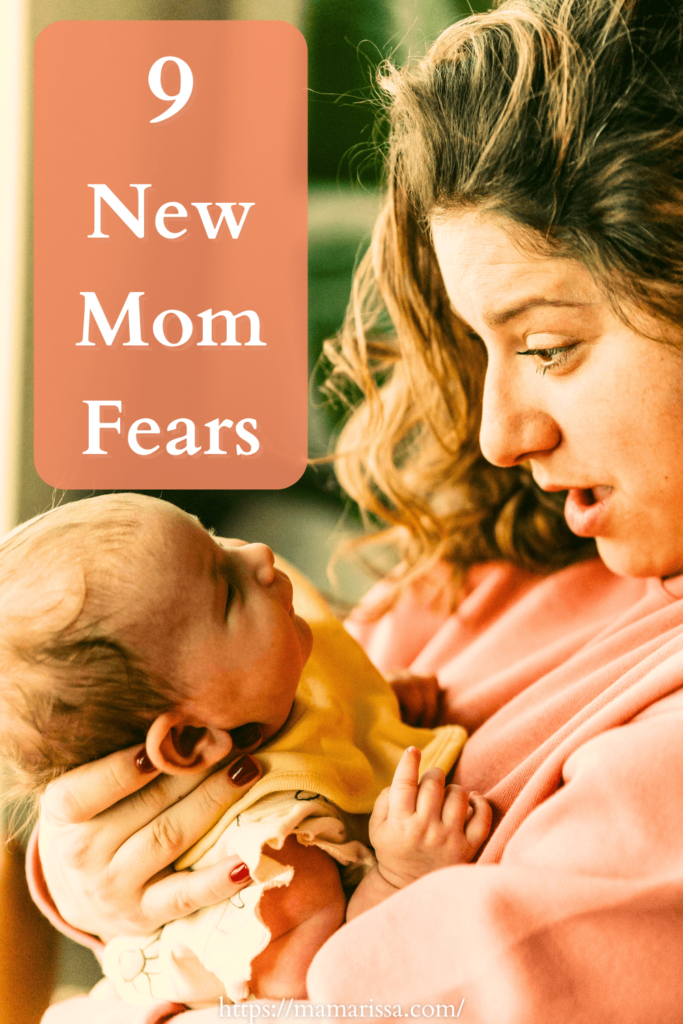
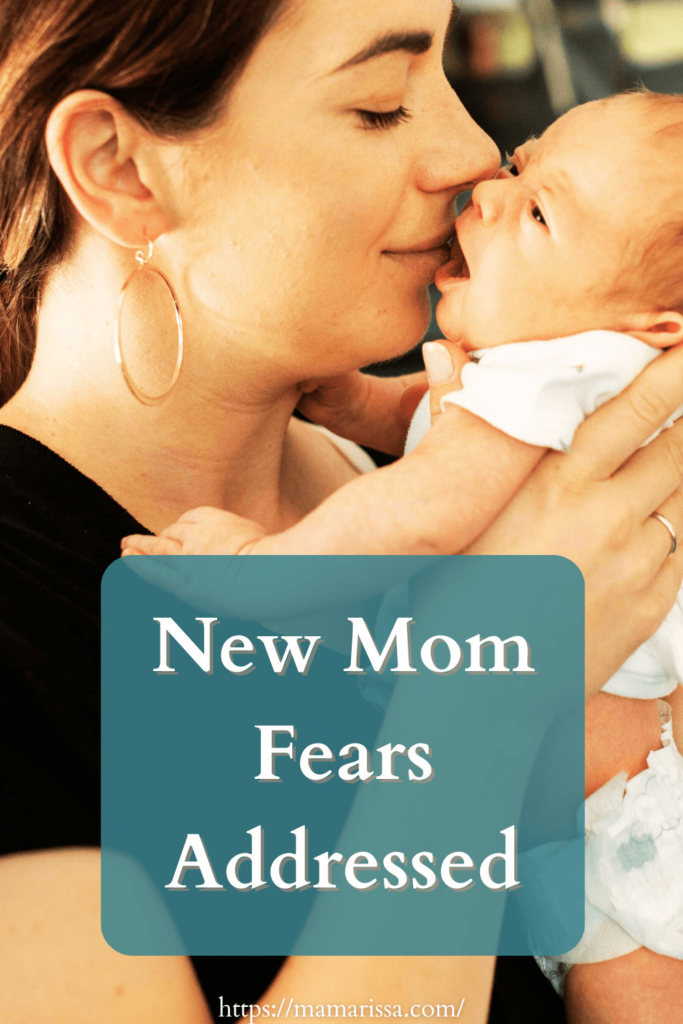
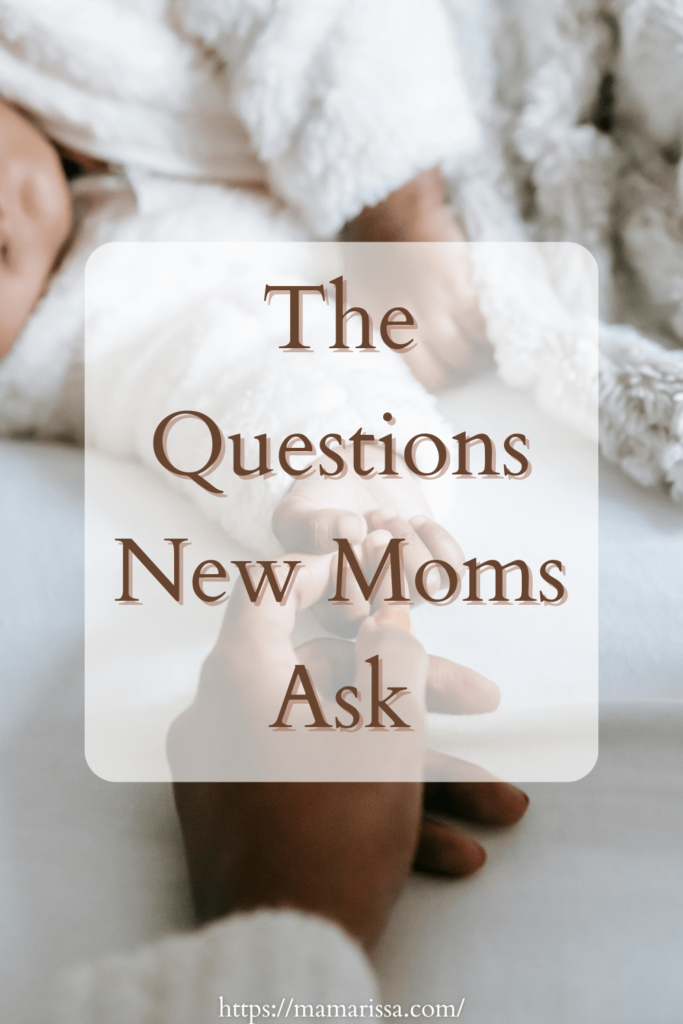
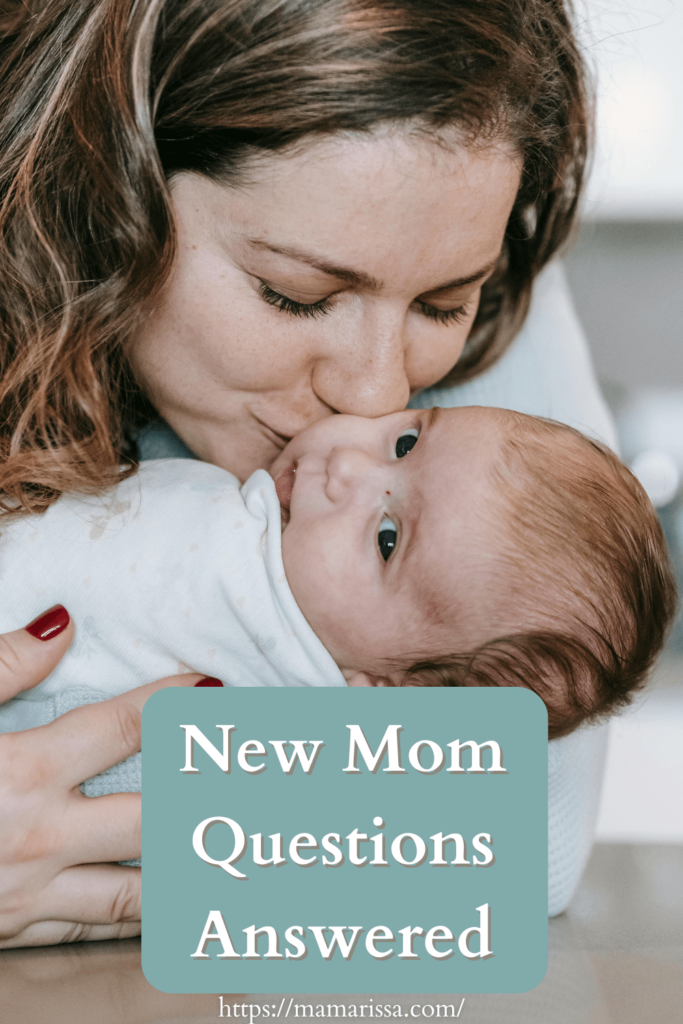



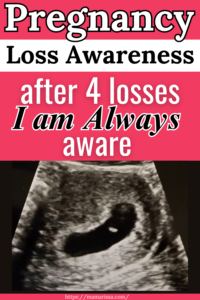

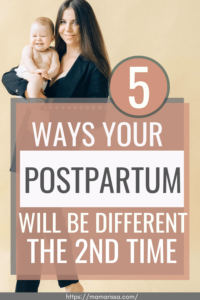



Leave a Reply